By: Bethany Wight, Biologist
UF/IFAS Range Cattle Research and Education Center
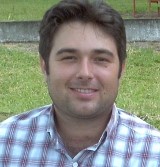
Joao grew up in Mineiros do Tietê, a small city in the Sao Paulo State in Brazil. His mother and father’s families grew up working in farming communities and then moved to the city of Mineiros do Tietê where they purchased multiple houses on the same street. Growing up he was surrounded by family and enjoyed playing with his cousins and siblings. His family first worked with crop plants such as citrus and also with a farm that made essential oils such as eucalyptus oil. The family eventually transitioned into transportation of agricultural products. His father also transported women’s shoes from their city to San Paulo. Joao often visited his grandfather and enjoyed hearing stories about how his grandfather worked in citrus to produce seedlings by grafting various citrus plant species. Hearing these stories from his grandfather and his family helped him realize his interests and ties to agriculture. In addition his father purchased two horses for him to take care of and learn from.
“My whole family worked in farms and ranches during some time of their lives, and it was this inspiration that led me to study animal sciences.”
Joao attended the Faculdade de Zootecnia e Engenharia de Alimentos (FZEA), University of São Paulo (USP) in Pirassununga. The town was originally home to the Tupi people, an indigenous group and the city’s name means “sound of fish” from the loud sounds the fish make when migrating upstream every year in December. During his undergraduate studies Joao was a member of the Group of Studies in Forage and Pastures (GEFEP), member of Tutorial Education Program (PET), and also performed some internships related to ruminant nutrition and forage and grazing management. His final undergraduate internship was at a livestock consulting company, visiting several farms and conducting some projects. He earned his Bachelor’s degree in Animal Sciences in 2009.
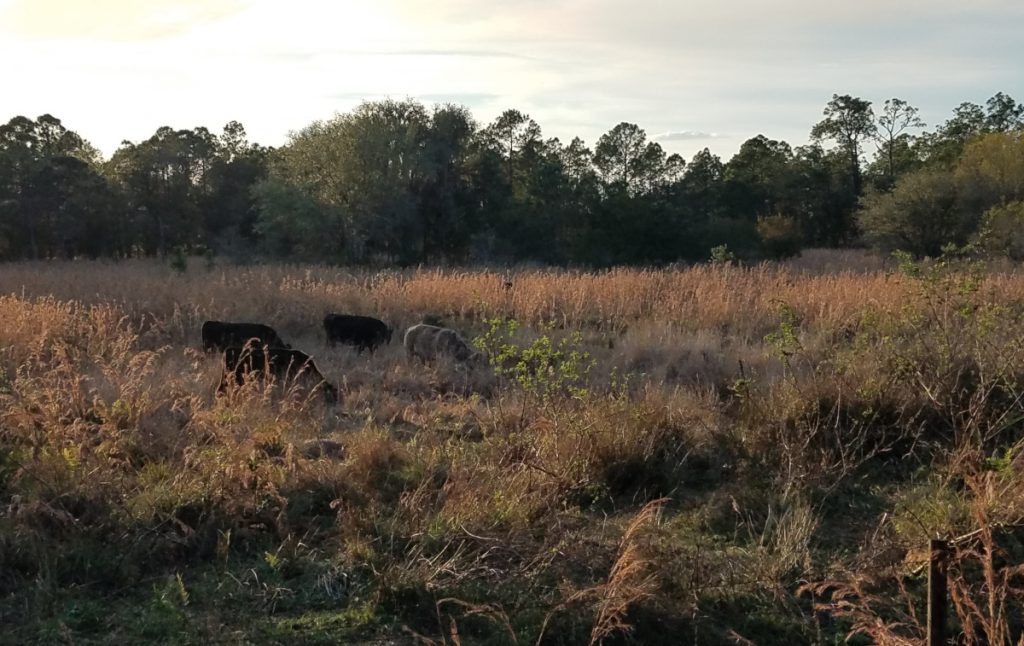
After earning his Bachelor’s degree Joao decided to continue at the same university and earn a Master’s degree. Joao was advised under Dr. Valdo Herling and their research focused on examining the use of two feed additives on the performance of beef heifers. One was a slow-release, coated urea and the other an antibiotic, Flavomycin. They found that the coated urea did not improve the average daily gain of heifers but the Flavomycin did improve average daily gain. Joao earned his master’s degree in Animal Sciences in 2014.
Joao was in the middle of his master’s degree when his past advisor, Dr. Valdo Herling, got funding to bring Dr. Joao Vendramini to spend a week at their program teaching a class on forage research techniques and visiting the experimental sites in Pirassununga.
“Dr. Vendramini came in December 2011 and his class was very productive, making all graduate students in our program very excited about what he was showing us. It really impacted us.”
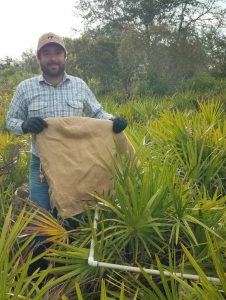
At the end of that week, Dr. Vendramini contacted Dr. Herling and asked if he had a student willing to spend six months at the RCREC at Ona, FL. Joao was selected and arrived in the US in March 2012.
“My first six months in Florida were very good, I really enjoyed it. I was being exposed to many different projects, many different people, many different cultures, and I enjoyed learning every bit of it. But it was not until the last month that I decided to talk to Dr. Vendramini about applying for a PhD position in his program. This I owe to Dr. Philipe Moriel, with whom I spent many moments talking about his research when he was a PhD student at the RCREC. He was the first one to say “Hey, why don’t you talk to Dr. Vendramini about a PhD application?”. And so I did. After I returned to Brazil, I finished my master’s, got a PhD scholarship proposal approved and got enough score on TOEFL and GRE tests, and started my PhD in 2014.”
Joao’s PhD research evaluated management practices to improve the productivity and nutritive value of a type of perennial peanut (Arachis pintoi) in South Florida. This type of forage peanut is found in South America and produces its own seeds, unlike the typical rhizome peanut plant used as forage in the US. This new type of perennial peanut was planted in mixture with bermudagrass and bahiagrass, and using applied grazing and clipping strategies they measured productivity and nutritive value. They found that while the new type of peanut plant persisted and produced viable seeds, the rate of spread in grass pastures was slow and it was not as productive as the rhizome peanut plant found in the US. Joao earned his PhD degree in 2018.
After receiving his PhD degree, Joao returned to Brazil and worked as a postdoc at the Universidade Estadual Paulista, in Jaboticabal, SP. Under the supervision of Dr. Telma Berchielli, he spent 8 months working in a multidisciplinary project evaluating the effect of different protein sources on animal growth and physiology, as well as nutrient dynamics on animal excreta, soil and atmosphere.
In 2019 Joao had the opportunity to return the RCREC as a research assistant on the LTAR (Long-term Agroecosystem Research) project, under the supervision of Dr. Maria Silveira. The project is evaluating the effect of fire frequency and mechanical vegetation control on several aspects of native rangelands in South Florida, including soil organic carbon, vegetation shifts, greenhouse gas emissions, animal performance and changes in nutrient stocks.
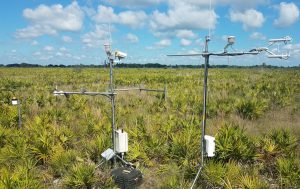
One of Joao’s main responsibilities is to take care of the Eddy Covariance Tower. The tower has a group of sensors that capture measurements of several environmental variables, such as CO2 concentration in the air, wind speed and direction, relative humidity, air temperature, and rain precipitation, among others. The Eddy Covariance technique is complex, however, in general, it integrates the variables measured by the tower and calculates gas fluxes of the surrounding ecosystem. For example, the technique allows scientists to calculate how much CO2 was removed or released to the atmosphere within a year. Joao is still learning about the tower analyses and is working in collaboration with Dr. Rosvel Bracho-Garrillo from the School of Forest Resources and Conservation at UF. Currently Joao’s main role is to conduct basic maintenance, collect data and do initial data processing.
Joao is also responsible for coordinating the cattle within the LTAR pastures. They have 76 cows in the grazing season and they are evaluating the effect of fire frequency and mechanical treatments in pastures on the cattle’s body condition score. They expect to observe changes in vegetation as treatments are applied to the land, and such changes may or may not affect animal diet.

While Joao is a native of Brazil, he was never very good at soccer. Given this he decided to get into music. He grew up listening to Brazilian country music and really enjoyed it. The style is considered an old (very old) type of music that was not commonly appreciated by people of his age. The main instrument used to play it is called a “Viola Caipira” (something like countryside guitar in Brazilian Portuguese). Joao’s father had always tried to play musical instruments before, but he was never able to do it. However, he had bought a guitar and a “Viola Caipira” and when Joao said he was interested in learning his father gave him his Viola and he started taking classes. Joao really enjoyed it and learned fast. He took 6 months of classes when he was 14, and since then has been teaching himself. Besides Viola Caipira, Joao can also play the guitar, accordion and 5-string banjo.
“I would like to proceed with my career as a researcher. My main objective now is to apply for research positions in the US, either at public or private institutions. I’d like to be in a stable research position in the next 5 years, and work on establishing a family.”
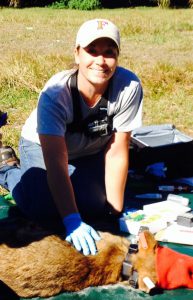
This was written by Bethany Wight, a biological scientist at the UF/IFAS Range Cattle REC in Ona, FL. If you have questions please contact her at bwight@ufl.edu.
 0
0
